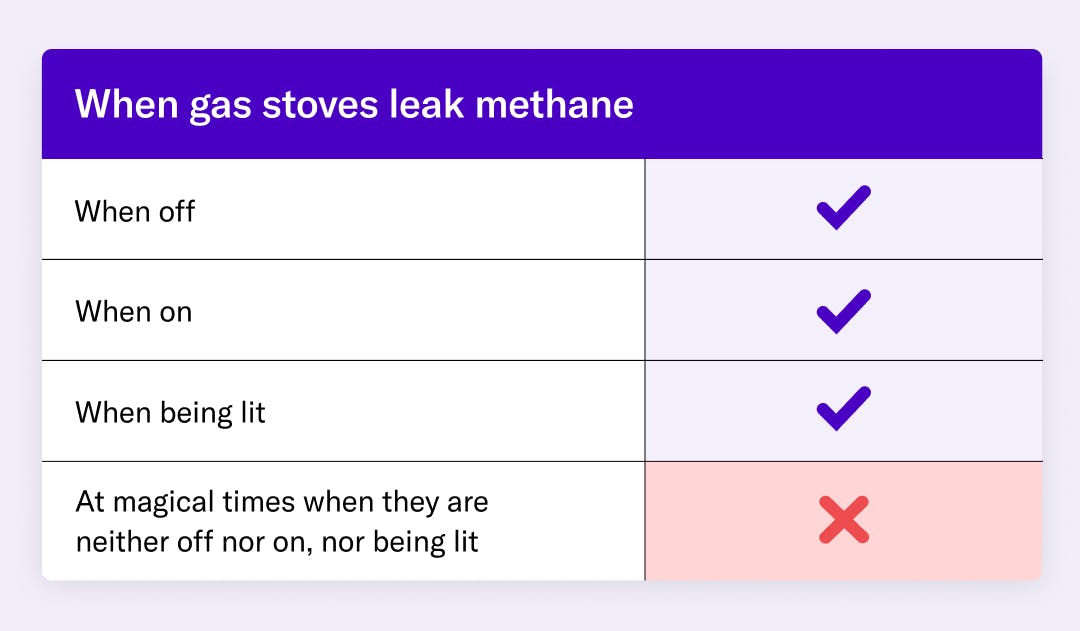Why gas stoves are dangerous to your health
Gas stoves pollute our homes — even when they’re off — and are linked to illnesses like asthma and cancer

You’ve probably heard that gas stoves are bad for your health. But you might be surprised by just how bad. Here are some troubling facts about gas cooking as well as some simple steps you can take to keep your home and family safe.
Gas stove pollution is like secondhand smoke
Gas stoves emit unsafe levels of benzene, a chemical linked to leukemia and other blood cancers. A recent Stanford study of 87 homes in California and Colorado measured benzene emissions from gas stoves and “found indoor concentrations above health benchmarks set by the World Health Organization and other public agencies.” The researchers found that in many cases, having a single gas burner on high or the oven set at 350ºF raised indoor benzene concentrations above the level of second-hand smoke.
And gas stoves leak even when they are off. Another recent study found benzene in unburned methane gas, meaning that the cancer risk from gas stoves can be high even when the burners are not on.
Gas stoves also emit several known respiratory irritants, including nitrogen dioxide, formaldehyde, and carbon monoxide. Research shows that nitrogen dioxide can cause pediatric asthma and aggravate asthma symptoms.
Gas stoves are extra bad for children
According to a recent study from RMI, a non-profit focused on global clean energy transitions, nearly 13 percent of childhood asthma cases in the United States can be linked to gas stoves in homes, comparable to the impact from secondhand smoke exposure. In some states like California and Illinois, that number is as high as 20 percent.
An earlier study found that having a gas stove in the home can increase the risk of childhood asthma by 42 percent.
Children are especially vulnerable because their “brain, lungs, and immune system continue to develop during infancy through age 6 years and beyond.” Their developing organs, small bodies, and high breathing rates make them more susceptible to the harmful effects of indoor air pollution.
Gas stoves leak when they are off
Gas stoves leak methane — a dangerous greenhouse gas that warms the planet — even when you’re not using them. A new study shows that “they’re constantly bleeding a little bit of methane into the atmosphere all the time.”

Methane leaks can occur between the gas stove and gas line when couplings and fittings are loose. Those leaks add up. A gas stove “leads to more emissions over 24 hours than the amount emitted while the burners are on," another recent study showed. And a Stanford University scientist calculated that annual methane emissions from gas stoves in the U.S. have the same climate impact as the amount of carbon dioxide emissions from 500,000 gasoline powered cars.
The truth is, gas stoves leak methane when they are off, when they ignite, and while they are on. Yes, you read that right. Gas stoves are always polluting the air.

How to protect your family and community
As soon as you are able, upgrade to an induction or electric stove. Induction stoves are superior cooking appliances and neither induction nor electric stoves emit dangerous pollution into our air. Upgrading to an induction stove will instantly improve your indoor air quality and the comfort in your home.

Later this year or early next year, rebates will be available for electric appliance purchases. Households can save up to $840 on a point-of-sale purchase of an induction stove or other electric home appliances. Visit Rewiring America’s IRA savings calculator to learn more about your personalized savings.
You can also improve your indoor quality immediately by following the suggestions below.
Aim to cook with the electric appliances you already have in your kitchen. This includes your electric kettle, toaster oven, air fryer, portable induction burner, slow cooker, rice cooker, and microwave.
If you have to cook on a gas stove, use your range hood or exhaust fans and open the windows to keep air circulating.
Use air purifiers with HEPA and carbon filters.
Never use your gas stove to heat your home.
Visit the EPA for more recommendations and ways to reduce exposure to gas stove pollution.
Induction stoves are the best way to cook food, keep pollutants out of the air, and keep your family healthy. Induction stoves are the best way to cook food, keep pollutants out of the air, and keep your family healthy. Electrify your home with Rewiring America's free electric cooking guide. Check it out.
First, a gas-free stove. Then an all-electric home?
We’ve launched a free tool to help you go all-electric. Make your plan. Maximize your savings. Get help along the way.
Start planning today